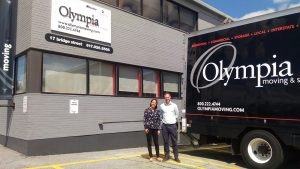
Dear movers, this time I want to introduce you one moving company that has started very small and has gone through a rapid growth for the last decade – Olympia Moving and Storage.
I met Rachael a couple of years ago during an event where she was leading an educational session about marketing and reputation management. You can rarely hear someone speaking honestly and intelligently about our industry. Well, it was hate at first sight [smile]. “I hate reviews sites!”, she blurted it. And then my first thought was: “How brave and genuine!” At least someone has the guts to voice it.”
Let’s be honest, reviews can be very messy, emotional and biased. There is not much to love about bad reviews. As much as we understand that criticism is inevitable and we can learn a lot from the negative feedback, it hurts every time we face up to it.
What Rachael says next made me love her: “You have to respond within 30 seconds”. It is said that when true leaders are challenged, they don’t whine, they act. And that always impresses me in people. Without any further ado, I want you to present you the story of Olympia Moving and Storage.

Rachael Fischer Lyons, Director of Marketing & Business Development (on the left) and Piet Gauchat, President at Olympia Moving & Storage (on the right).
Can you tell us a bit more about the history of your company?
Piet Gauchat: Michael Gilmartin who is the founder worked as a mover while attending the Northeastern University. He quickly found out that movers were often stereotyped as inefficient, and he recognized an opportunity to redefine this space. He launched the company 25 years ago with three employees and a truck, and they quickly built a reputation by literally running up and down the stairs of 4-floor apartment buildings in Boston. To this day Michael maintains a very hands on approach and spends approximately half of his time managing projects onsite. From inception, his focus has been on getting every detail right.

Special Olympics Massachusetts tournament on Cape Cod. Olympia Moving donates logistics to over 25 Special Olympics events annually.
Olympia has actually gone through three name changes over the years. For a long time we were “Olympic Moving & Storage;” given that several of our movers had competed in or were training for the Olympic Games, and the name embodied the company’s approach. In 2007, we were required to change the name by the US Olympic Committee. We used this as an opportunity to re-brand and it was at this time that the iconic trucks and logo were born.
In 2001 we opened our office in Virginia. Then in 2014 we added another facility in Massachusetts and two years later, in 2016 we started our office in Pennsylvania. This year we purchased American Relocation in Austin, TX.
What were some of the challenges you had to cope with over the years?
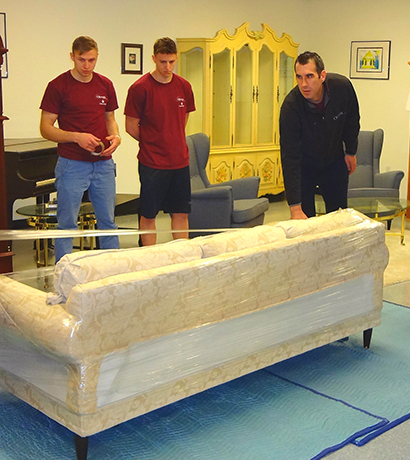
In the Olympia Training House, new crew members learn how to prep and protect a sofa to move.
Piet Gauchat: The ongoing and somewhat relentless growth that we have experienced during the last nine years has been very difficult to manage. A specific process that might have worked perfectly two years ago might have to be completely transformed to account for changes in volume. An example of this would be the management of our interstate business. Every September we do a deep numerical analysis of our performance from multiple vantage points. We use these numbers to reform pricing, capacity, process, systems – in short everything about this business line.
As you scale, you either need to add resources or you have to make the process more efficient. You can’t grow sustainable without maintaining the quality, and you can’t maintain quality unless you make changes in how you manage the service. We provide residential local, interstate, and international moving and a range of commercial services. We work with COD customers, military members, and a variety of accounts. The diversity has been our biggest strength – and most significant challenge.
How would you profile the right person to work at Olympia?
Piet Gauchat: Generally, most people who work at our company have come from outside the moving industry. We also have a lot of home-grown talent; and numerous employees who have been with the company for more than 20 years.
We hire a lot of former college athletes, because they appreciate the work and dedication required to meet an objective. We look for people who are competitive, willing to contribute beyond the specific job description; take a leadership role and are accountable.
How do you market to your employees?
Piet Gauchat: I think our pitch is somewhat comparable to the Marines – “It is the hardest job you will ever love.” It is a really difficult industry to work in and we are a particularly demanding company. You are going to work very long days and the last thing you ever want to do is let down your teammates.
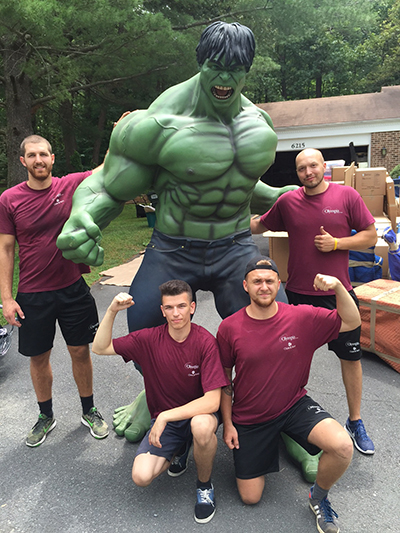
Olympia has moved many unusual and valuable items, including this Hulk statue in 2015.
People come to work at Olympia, because they think they have what it takes to work in a very demanding environment. I think that our approach is reflected in our facility, the equipment that we use, the training we employ and our uniforms. There is a real allure to working towards a higher standard and a collective refusal to accept mediocrity.
And how do you make sure that your customer service stays top-notch?
Piet Gauchat: I am tremendously proud of the product that we put on the street every day and it is direct reflection of who we are as an organization. We measure and analyze every facet of our performance and it is these numbers that help change and innovation within the organization. We are constantly challenging the status quo and reinventing processes.
This approach is empowered by a comprehensive software solution (MoveWare) that allows us to map and log every client communication. From the moment we first engage a prospect, I can tell you, based upon job type and account, exactly how that experience is going to unfold. How expectations are set, and how we deliver on those expectations is what being a service provider is all about. All of this creates continuity and translates into net promoter score of 81 and the fact that 96% of our clients would use us again or refer us to a friend.
A tangible example of our evolving service philosophy is the client portal. This is a solution that was not even viable a few years ago, and has now been fully integrated into our client experience. The portal provides real time information on every facet of the client’s move, offers a host of resources, and allows the client’s to engage with us when it is convenient for them and in a manner of their choosing.
Software let us manage every aspect of our moves; quoting, customer service, operations planning, and billing. This ensures that every customer gets the guidance that they need, with check-in calls, confirmation emails, moving tips, and online resources timed to the start of their move. Customers can log in to complete their booking documents, track their service dates, and pay their bills.
It is key that our crew is provided both initial and continuing training. We have installed an “Olympia Training House” in one of our facilities so our crews can practice their packing and moving skills before they get to the customer’s home. We also have an online training portal with dozens of videos and online quizzes.
What are some particular projects that you have taken part in order to support your local community?

Olympia President, Piet Gauchat, running the Boston Marathon to raise money for Special Olympics in 2018.
Piet Gauchat: Olympia Moving & Storage has been the official logistics partner of Special Olympics Massachusetts since 2013. We also sponsor Special Olympics organizations in Virginia and Washington DC. On an annual basis, we donate logistics and transportation support for over 25 Special Olympics competitions and fundraising events; which factor into a total contribution of more than $60,000.
Olympia also directly fundraises for the athletes. I ran the Boston Marathon in 2017 as part of a Special Olympics fundraising initiative and raised $10,000. Michael Gilmartin once raised money by rappelling down from the top of a 30 story building.
Special Olympics’ mission is to prove that their athletes can do more than what is expected, and to be brave in their attempt. In so many ways this organization reflects our corporate values and the opportunity to work alongside the amazing volunteers and athletes has been a great source of inspiration for our team.
You do a lot of household goods moves, can you give us some examples of particular challenging jobs?
Piet Gauchat: Every year we do work for a number of professional athletes, celebrities, and C-level executives; and these moves require a certain amount of additional attention. We have moved people who work for Harvard University and the FBI.
Often our commercial work is more challenging to plan and manage, but last year we completed a $150,000 residential project for a client that was very involved. We had to build 40 crates on site for the job. There were life-size bronze statues of people in the garden. We had to hire a specialist restoration company to clean them before we loaded them into custom crates. In addition, the contents of the home were being moved to four different locations; including a shipment to Asia.
If a move like that is not properly managed, if the details are not right, then things start to go south and it can be very difficult to recover. In those kind of high profile jobs, there are always communication challenges. Often we are communicating with a personal assistant, the customer, the realtor, the building managers, the third party vendors, HR for the shipper’s company – the list goes on and on. The more stakeholders on a given project, the more challenging the communication.
We are constantly getting requests to move strange pieces, but I think probably the most interesting challenge was moving a piano up the 50 flights of stairs of the Prudential Building in Boston. We did this as part of a fund raising effort for the Cystic Fibrosis foundation and raised over $5,000 for a great cause. The event generated some great press and we were able to complete the challenge in approximately 45 minutes.
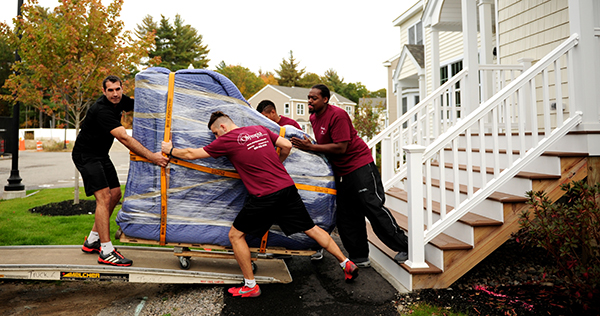
How do you tackle online reviews?
Piet Gauchat: I would say that we have many of the same frustrations as every other mover related to Yelp reviews getting filtered.
As for online review in general, we accept the fact that this is the playing field and it is level for everybody. There is no secret recipe to providing a great service. It’s hard and you need to do it right. Focus on the details. Break down every facet of your process and figure out how to reproduce the best version of yourself. Accept the criticism and use it to make a better company.
Everybody gets a survey from us the day after their move. This is very helpful because it alerts you to a problem immediately so you can repair any damage before the client resorts to social media.
When we do get online reviews that aren’t positive, we respond right away. It triggers an internal reaction and we get the relevant parties to figure out what happened and how to move forward with a solution.
If we make a mistake, I will often pick up the phone directly and speak to the client. It is helpful for me to hear the consumer’s side of the story, even though sometimes it is a painful exercise. I don’t ask people to change a negative review, but they frequently do if they feel that they have been heard and appropriate action has been taken. It matters that you are paying attention.
What were some of the mistakes that you have made so far? And what were the lessons learned?
Piet Gauchat: I don’t think that we are afraid of mistakes. When somebody starts working at Olympia, I always tell them: “You know you are going to make a lot of mistakes. Let’s accept that right now and let’s make them upfront. Let’s get them out of the way in the first six months.” We do that just so that new employees understand that we are here to support their growth and development.
Later I was working with an employee who has been working for us on the moving side of the business for a few years. We try to promote him to work on the sales side of the business. He has a very good knowledge of the moving process itself, but he is now learning the sales side of the job. The way he had set a job up, it wasn’t set up for us to be successful. It was not a significant issue, but the way it was set up was problematic and we were actually going to lose money. Of course these kind of situations are part of the learning curve. We had to accept the fact that we were going to lose money out of those orders and work with that person. So I spent probably 20 minutes with this employee this morning, going through how it could have been set up differently for success – what are some of the alternate options that could have been undertaken.

New crew members at the Olympia Training House with John, an Olympia training manager.
And you know we talked about it before, about how critical it is to set up the proper expectations, because that ultimately defines success or failure. And how we could do on the next order to set expectations that we can deliver. It is fine that we are going to lose money. We are going to be accountable and so at the end of the day it won’t damage our reputation. It’s just a learning opportunity for us.
I think we do a pretty good job internally of analyzing the business and our performance across various business lines. We are a very numbers-driven organization, and we use numbers to measure every facet of what we do and drive change.
Our business is about getting thousands of details right, across multiple branches, every single day. We do get it right the vast majority of the time, but every day we make mistakes and we learn from them, and we get better. Those mistakes are reflected in how we sell, how we set expectations, how we manage the client, how we execute the move and in billing. They are inevitable and as long as you are not consistently repeating the same mistakes, you are building capacity within your organization.
What are some of the current regulations or challenges that you are currently coming up against?
Piet Gauchat: Regulations such as ELD’s or hours of service are universally applicable, so you adapt and adjust and move forward.
I would say the biggest challenge we face is labor and the current unemployment rate is a exacerbating the situation. We need great people to represent us in the field. We have four full-time recruiters and spend a lot of time, resources and money trying to hire and train the best people. We need to be able to demonstrate that we are not only a great place to gain experience and earn some money, but that there is a long-term career trajectory.
How do you see the company developing in the near future?
Piet Gauchat: The overarching goal is to continue to grow the company in a way that focuses on quality and is profitable.
The other big challenge is balancing opportunity against resources. As we have continued to expand we have so many diverse opportunities; many of which require specific expertise. Navigating these opportunities and recognizing those that build on our core competencies and those that are a significant departure, or create disproportionate overhead can be tricky.
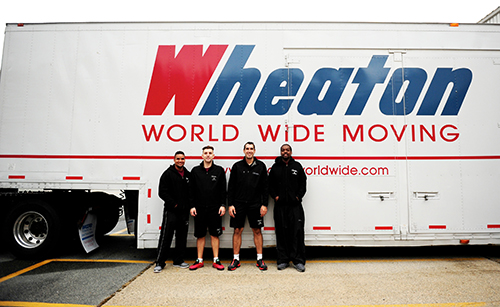
Wheaton Worldwide Agent of the Month: July 2007, August 2010, August 2011, April 2012, May 2013, December 2016, May 2018.
What is your message to people on the move and to other industry peers?
Piet Gauchat: I think that probably the defining characteristic of this company is our willingness to challenge the status quo and reinvent a process, a team, a business line or an approach. With the advent of new technologies, self-driving trucks, and a new competitive landscape, I think there will be lots of interesting opportunities for those with the vision to recognize them. We need to be quick to react and dynamic in our approach to new trends.
The key is to do your homework. The mistake that people usually make is that they look at movers as a commodity and, as with any commodity; price becomes the foundational decision-making criterion.
If you have spent half a million dollars on a home and are concerned about a minor differential on an hourly rate, you have missed the point. Focus on value. If people invested a little bit more time in the selection process, we would have avoided a lot of issues that we have faced historically with some of the bad actors in this industry.
Our industry has not done a good job in educating the consumer on what differentiates a great mover from a bad one. Without the consumer understanding the criteria, it is very difficult for them to make a decision.